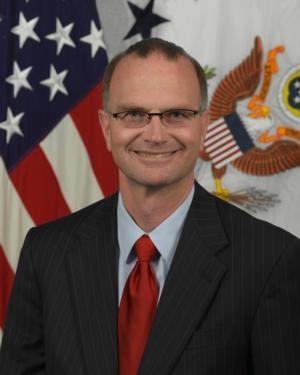Fri, Jun 08, 2012
U.S. Has 'Fine-Tuned' Methods To Promote Responsible Use Of Space
The U.S. has fine-tuned its methods to promote responsible use of space and strengthen international partnerships, Ambassador Gregory L. Schulte, the deputy assistant secretary of defense for space policy, said during the 2012 Women in Aerospace Conference June 1. In his keynote address at the conference, Schulte outlined the plan to protect U.S. advantages and sustainability in space as directed by the National Security Strategy for Space issued by Defense Secretary Leon E. Panetta and national intelligence officials.

"Space is no longer a pristine environment," Schulte (pictured) said. "We have to think differently about how we cooperate with others in space."
Schulte explained that burgeoning interest in space by a number of nations is both an asset and a liability. "Allied capabilities can augment ours, add resilience and increase our ability to operate in a contested space environment when adversaries may be trying to take away our space capabilities," he said. "As there are more and more actors in space, it becomes more important that we bring a certain amount of order to that domain, that we encourage countries to act responsibly." As such, Schulte said, Secretary of State Hillary Rodham Clinton and U.S. Strategic Command, based at Offutt Air Force Base, Neb., have weighed in this year to take deliberate steps in negotiating space situational awareness agreements with countries across the globe.
The discussions have united the "European Union and other space-faring countries to develop an international voluntary code of conduct meant to encourage countries to act responsibly and call out those who act irresponsibly," Schulte said.
The norms, Schulte asserts, aim to help U.S. and coalition countries share information on an emergency basis, encourage best practices to buffer the uptick of mishaps and control the creation of additional debris in space. "(STRATCOM) tracks over 20,000 pieces of debris -- and that's just what they can see," Schulte said. "NASA estimates there are probably hundreds of thousands of pieces of debris up there."
Harnessing international partnerships also includes a plan to expand the Joint Space Operations Center at Vandenberg Air Force Base, Calif., into a coalition asset by integrating Canada's first operational military space-based telescope system, Sapphire. A larger constellation of satellites supplied by international partner nations provides greater coverage and bandwidth, Schulte said, and also creates an international space alliance that can act as a deterrent to threats against the U.S. and its allies.
More News
He Attempted To Restart The Engine Three Times. On The Third Restart Attempt, He Noticed That Flames Were Coming Out From The Right Wing Near The Fuel Cap Analysis: The pilot repor>[...]
Make Sure You NEVER Miss A New Story From Aero-News Network Do you ever feel like you never see posts from a certain person or page on Facebook or Instagram? Here’s how you c>[...]
From 2009 (YouTube Edition): Leading Air Show Performers Give Their Best Advice for Newcomers On December 6th through December 9th, the Paris Las Vegas Hotel hosted over 1,500 air >[...]
Aero Linx: NASA ASRS ASRS captures confidential reports, analyzes the resulting aviation safety data, and disseminates vital information to the aviation community. The ASRS is an i>[...]
“For our inaugural Pylon Racing Seminar in Roswell, we were thrilled to certify 60 pilots across our six closed-course pylon race classes. Not only did this year’s PRS >[...]
 NTSB Final Report: Rutan Long-EZ
NTSB Final Report: Rutan Long-EZ ANN FAQ: Turn On Post Notifications
ANN FAQ: Turn On Post Notifications Classic Aero-TV: ICAS Perspectives - Advice for New Air Show Performers
Classic Aero-TV: ICAS Perspectives - Advice for New Air Show Performers ANN's Daily Aero-Linx (06.28.25)
ANN's Daily Aero-Linx (06.28.25) Aero-News: Quote of the Day (06.28.25)
Aero-News: Quote of the Day (06.28.25)



